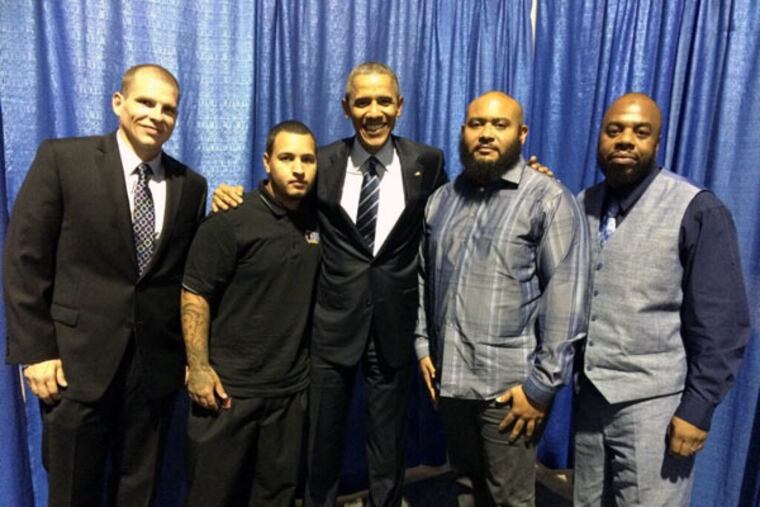Obama cites Phila. man in speech about criminal justice
Near the end of President Obama's speech Tuesday before the NAACP convention, Jeffrey Copeland heard the president tell the thousands at the Convention Center how the Francisville man had been arrested six times before his 35th birthday.

Near the end of President Obama's speech Tuesday before the NAACP convention, Jeffrey Copeland heard the president tell the thousands at the Convention Center how the Francisville man had been arrested six times before his 35th birthday.
Copeland, a 39-year-old full-time criminology student at Temple University, was stunned.
"I didn't know that he was going to put it out like that," Copeland said Tuesday night. "I got a little choked up. It's one thing to hear yourself say it. It's one thing to say it to another person. And it's a completely different thing when the president says it to a large crowd."
Copeland, who was sitting a few rows from the front, took in the speech and quietly left after the president finished.
Obama's address, which he called more than just "barbershop talk," focused on a criminal justice system that he says disproportionately affects minorities.
"African Americans and Latinos make up 30 percent of our population. They make up 60 percent of our inmates," Obama said. "A growing body of research shows that people of color are more likely to be frisked, stopped, questioned, detained."
Obama advocated sentencing reform, including abolishing prison sentences for nonviolent drug crimes, and called for Congress to pass a reform bill this year.
Copeland could relate.
His arrests were primarily for DUI, he said, and one was for violating parole. None was for a violent crime, he said.
Nevertheless, he did two stints in prison, he added.
Records show an arrest in 2007 for public drunkenness and disorderly conduct.
In 2009, he began a two-year stretch behind bars in Philadelphia.
While in prison, he said, he began running in place to stay in shape. He also did it, he said, because he was learning to be sober and healthy.
His cellmates, he said, called him "the Running Man."
By then, he had started changing his life.
"Being incarcerated gave me this want and this need to better my life in several different realms," he said. "Running was one of them. Education was one. And being sober."
He has since participated in the Broad Street Run, a few marathons, and numerous 5Ks. Six years first taking up running, he said, he has a "wall full of medals."
After his release in 2011, Copeland enrolled at Community College of Philadelphia.
After meeting Tara Timberman, director of the college's Reentry Support Project, Copeland applied himself, graduating in 2013 summa cum laude with a 3.9 GPA and an associate's degree in liberal arts.
He is now at Temple, where he expects to graduate with a bachelor's degree in criminology after the fall semester is over.
The president cited Copeland's story as something that shows Americans can achieve anything.
"You never look at crossing the finishing line," Obama said. "You attack it by putting one mile after the other. It takes steps; that's true for individuals. It's true for our nation."
Last year, Copeland began volunteering at the reentry program that helped him get back on his feet.
"I think something the president was able to express was, it's difficult for individuals to come out of incarceration and reenter into a free society," Copeland said. "I made an analogy, just like running in general, you don't look at the finish line. Look at it as putting one foot in front of the other small steps to betterment."
215-854-2714